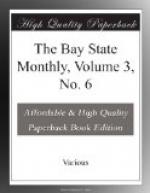“Then the Master in his place
Bowed his head a little space
And the leaves by soft airs stirred
Lapse of wave and cry of bird
Left the solemn hush unbroken
Of that wordless prayer unspoken
While its wish, on earth unsaid,
Rose to Heaven
interpreted.
As in life’s
best hours we hear
By the spirit’s
finer ear
His low voice
within us, thus
The All-Father
heareth us:
And his holy ear
we pain
With our noisy
words and vain.
Not for him our
violence
Storming at the
gates of sense,
His the primal
language, his
The eternal silences.”
Mr. Whittier always goes to this meeting when he is well enough. The May Quarterly Meetings of the Society of Friends are held at Amesbury. There are a good many members of this Society in the town, and there is among them a hospitality, a kindness, and a cordiality that added to their quiet ways and the refined dress of the women makes them interesting.
It goes without saying that Amesbury has also the allotment of churches of other denominations usual to New England towns.
Thirty years ago and more, the Amesbury and Salisbury Mills were two distinct companies. The agent of the former mills, Mr. Joshua Aubin, was a gentleman of fine presence. After he left Amesbury, he sent to the town as a gift the nucleus of its present Public Library, which, although not absolutely free has only a nominal subscription to pay the services of the librarian, and for keeping the books in order.
[Illustration: John G. Whittier]
Mr. James Horton, agent of the Salisbury mills, was more of the rough-and-ready type of man, a little bluff, but frank and kind-hearted. Both gentlemen as it happened, lived in Amesbury and were of one mind in regard to the character of their operatives. It was before the influx of foreign labor, and the men and women in the mills belonged to respectable, often well-to-do American families. Rowdyism was a thing unknown to them, and as to drunkenness, if that fault was found once in an operative, he was reprimanded; if it occurred again, he was at once discharged. And so Amesbury, though a manufacturing town, was in its neatness and orderliness an exquisite little village with the Powow Hill at its back and the hem of its robe laved by two beautiful rivers. After Mr. Aubin’s ill health had made him resign his place, the father of Prof. Langley, well-known to science, was agent for a time, and carried on matters in the spirit of his predecessors. But there came a change, the mills were united under one control, and an agent was sent to Amesbury for the purpose of forcibly illustrating the fact that corporations have no souls. He did it admirably. Work was started at high pressure, there came a rush of foreigners into the place, many of the old towns people moved away in disgust, and the new took the place




